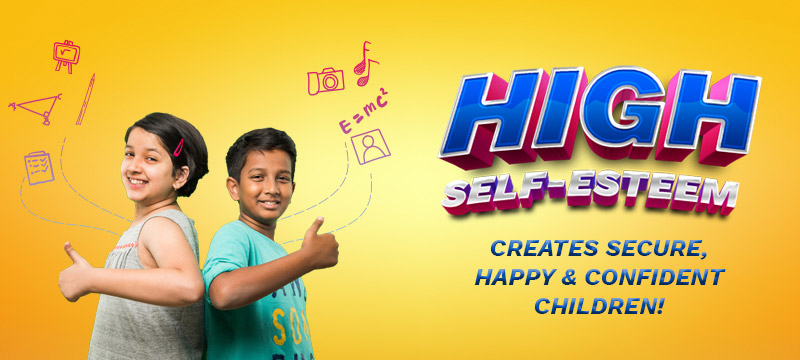
Never bend your head. Hold it high. Look the world straight in the eye.
– Helen Keller
As children learn new skills expeditiously, they also need to develop confidence and self-esteem to pursue any skill-set. A healthy sense of self-esteem is an important ingredient for the overall development of children. The child’s social, behavioural and emotional health will play a crucial role as to how they handle challenges, setbacks, peer pressure and disappointments throughout life. On the other hand, low self-esteem can result in disappointment, anxiety, trouble at school and work, unhealthy relationships, isolation and even depression.
Let us enumerate some pointers for empowering our children with positive self-esteem:
- Respecting children: Respect the children, never put them down, steer clear of talks of competition with them and instead seek dialogue. Ask them about specific behaviours and discuss about their ideas and feelings and give them an opportunity to express their opinions.
- The right support: Children are often looking for support. If your child is struggling with self-esteem issues, try not to verbally talk down to the child when he disappoints you. Instead, try applauding the child and supporting him for all the positive actions. Do not imply to the child that he is grateful to find such a supportive family, as that conditions him.
- Emotional validation: As obvious as this sounds, parents and teachers need to allow children to feel and express their emotions – which can be ranging from sadness to extreme elation. Educating children that it is alright to feel a certain kind of blue or a sudden bolt of joy, prepares them for adulthood. Letting their vulnerability out and teaching them to spring back is the best way to acknowledge your tiny human’s complex emotions.
- Raising self-reliant kids: Kids associate with self-esteem the moment they are pushed to rely on others. Encourage children to be independent from a young age – this boosts confidence and cuts down the slack. Narrate relevant stories of independent people who inspire you, and your kids will emulate them.
- Connect with empathy: It is advisable for parents and caregivers to listen to children more frequently and encourage them to vent their feelings through dialogue. Later in their adult lives, these children will be vocal about how they feel at work or in relationships, making them a brand of confident youth. They will acknowledge that they should express their empathy too!
- Applauding achievements: Ensure that the child is praised for every achievement, big or small. If encouraged properly, children grow to be very energetic and develop strong self-esteem.
- Sports and sportsmanship: Self-discipline and the feeling of camaraderie develop strongly when the youngsters learn a sport and practise it diligently. It allows them to explore their talent, respect their opponent and indulge in fair play.
- Encouraging skills and talents: It is often the case that a child excels in a particular activity. Empowering him with the decision to pursue his interest develops a deep sense of humility, self-respect and the belief to achieve his dreams.
- Set realistic goals: While encouraging the child to achieve better results is good but being overly pushy towards perfection can prove to be detrimental. Unrealistic images of self-worth attached to grades and academic performance can adversely affect the child to become insecure, anxious and even under-confident.
- Parents and teachers are role models: Any child learns from the parents, caregivers and teachers. Thus, it is mandatory to set a good example for the budding adults!
Activities to Try at Home –
1. Packing for a Trip
Focus Skill: Independence
Instill confidence in your child by encouraging them to practice independence. Before you plan your next family trip, ask your children to pack their own suitcases. Once they’re packed, check the suitcase and prompt them to think about items they missed. Instead of saying, “You forgot your hiking shoes,” say, “Do you have everything you need for hiking the trail?”
2. Invent a Recipe
Focus Skill: Learning from Mistakes
Help your child see mistakes as learning opportunities, not failures. Gently encourage mistake-making by asking your child to invent their own pancake recipe. Have them write down an ingredient list and quantities of each item. Supervise the process so that nothing dangerous is ingested, but do not interfere. Even if your child adds something unusual to the recipe (like goat cheese or garbanzo beans!), let them experiment. After cooking a test batch of pancakes, ask, “What could you have done differently?” Then, allow your child to modify the recipe and try again.
3. Make Slime!
Focus Skill: Teaching Others
Children can build self-assuredness and develop confidence by demonstrating newly-learned skills when interacting with others. Give your child a chance to impress their friends and have fun by teaching them to build “slime” (a gooey substance that can be stretched or moulded). Start by giving your child a recipe for “slime” and have them follow directions without your help. Once your child has concocted their slime, ask them to explain the process to you. Then, invite a few friends over! Have your child demonstrate the slime-making process before everyone tries it for themselves.
4. Chore with a Purpose
Focus Skill: Care of Environment
Taking on a consistent chore can be a huge responsibility. In order to promote your child’s confidence in their ability to care for their environment, have them pick out a special chore. They could be in charge of watering the plants, walking the dog or sweeping the floor. Compliment them for good, consistent behaviour with specific praises such as, “The plants look nice and healthy because you’ve been watering them regularly” or “Thank you for walking the dog every day. I know he enjoys it!
Reinforcement always helps in better learning.
We empower children
The highly experienced and qualified teachers as well as the management at Ruby Park Public School (RPPS) in Kolkata are aware that children need to be bolstered with self-esteem to raise independent learners and well-developed individuals. The dedicated teachers provide the young students with an environment that fosters their overall personality and academic brilliance. The specially-curated curriculum is a harmonious blend of various disciplines connected to academia and co-curricular activities. Students are encouraged to participate in activities and events to empower them to succeed in much more than just their scholastic endeavours, all in all providing a perfect platform to hone their confidence levels and self-esteem.
For more information, visit www.rubypark.com

